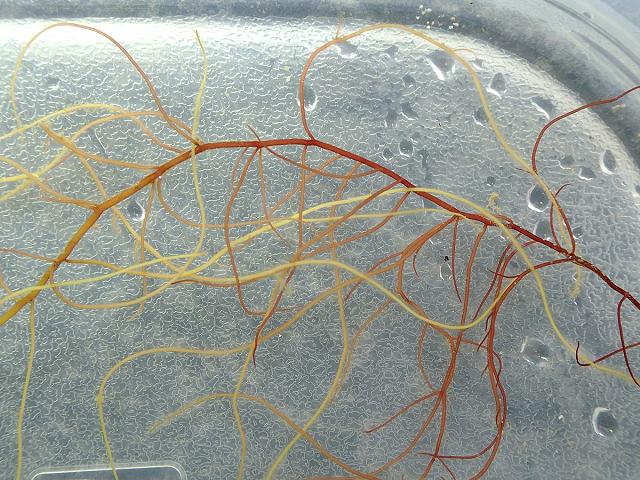
APHOTOMARINE
An educational resource dedicated mainly to the photography
and diversity of marine life that can be found in coastal waters
and intertidal areas of Great Britain and Ireland by David Fenwick.

Gracilariopsis longissima (S.G.Gmelin) M.Steentoft, L.M.Irvine & W.F.Farnham, 1995 ? - Long Wart Weed (2)
Scroll down and rollover titles to change screen image or click on title to view image.
A photographic study of what is likely to be an atypical form of Gracilariopsis longissima, Long Wart Weed, see notes below.
Long Wart Weed
Gracilariopsis longissima
- upper part of frond in a shallow container 1
Long Wart Weed
Gracilariopsis longissima
- upper part of frond in a shallow container 2
Long Wart Weed
Gracilariopsis longissima
- basal part of thallus attached to a small stone 1
Long Wart Weed
Gracilariopsis longissima
- holdfast 1
Long Wart Weed
Gracilariopsis longissima
- holdfast 2
Long Wart Weed
Gracilariopsis longissima
- section / base of frond 1
Long Wart Weed
Gracilariopsis longissima
- section / base of frond 2
Long Wart Weed
Gracilariopsis longissima
- base of thallus with 1.0mm division rule 1
Long Wart Weed
Gracilariopsis longissima
- base of thallus with 1.0mm division rule 2
Long Wart Weed
Gracilariopsis longissima
- thallus with 600mm long rule 1
Long Wart Weed
Gracilariopsis longissima
- thalli with 600mm long rule 1
Long Wart Weed
Gracilariopsis longissima
- in-situ at Carnsew Pool 1
Long Wart Weed
Gracilariopsis longissima
- in-situ at Carnsew Pool 2
Long Wart Weed
Gracilariopsis longissima
- in-situ at Carnsew Pool 3
Long Wart Weed
Gracilariopsis longissima
- substrate pre-colonisation 1
An area of algal some 50m x 5m was found just below the low tide level in the NE corner of Carndew Pool, Hayle, Cornwall, 02.007.20. The algae was very fine and over 900mm in length, this was likely down to environmental conditions within the small saline lagoon, but also climatic factors realating to the weather. There was a very dull / wet winter, which was followed by the sunniest spring on record in 2020.
I am very grateful for the advice of Prof. Christine Maggs who has suggested what the likely species here is. Apparently this type of growth is very similar to what she found at Portland Harbour, when there was sequenced the results came back as Gracilariopsis longissima.
The species here carries a '?' because gracilaceae are very difficult to identify under normal / average conditions, give them an odd or extreme location and abnormal weather conditions and the only way they they can be identified is likely by genetic sequencing. So please DO NOT use these images for identification, but use as a guide only.
AlgaeBase is a database of information on algae that includes terrestrial, marine and freshwater organisms.

The main objective of this website is in furthering environmental awareness and education through the medium of photography. To increase awareness and access to the wildlife of the region and help
people find and identify it. Sometimes the difference between species is obvious but many species can only be determined by observing microscopic characteristics that are specific to any one species.